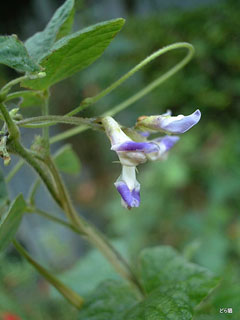 |
|
http://photozou.jp/photo/show/110033/27328427 |
 |
|
Translate this page:
Summary
Physical Characteristics

 Amphicarpaea edgeworthii is a PERENNIAL growing to 1.5 m (5ft). The species is hermaphrodite (has both male and female organs).
Amphicarpaea edgeworthii is a PERENNIAL growing to 1.5 m (5ft). The species is hermaphrodite (has both male and female organs).
It can fix Nitrogen.
Suitable for: light (sandy), medium (loamy) and heavy (clay) soils. Suitable pH: mildly acid, neutral and basic (mildly alkaline) soils. It can grow in full shade (deep woodland) or semi-shade (light woodland). It prefers moist soil.
UK Hardiness Map
US Hardiness Map
Synonyms
Plant Habitats
Woodland Garden Sunny Edge; Dappled Shade; Shady Edge; not Deep Shade; Cultivated Beds;
Edible Uses
Edible Parts: Seed Seedpod
Edible Uses:
Seed and seedpods - cooked[46, 61, 105, 177]. The seedpods are harvested when green and used for food[2].
References More on Edible Uses
Medicinal Uses
Plants For A Future can not take any responsibility for any adverse effects from the use of plants. Always seek advice from a professional before using a plant medicinally.
None known
References More on Medicinal Uses
The Bookshop: Edible Plant Books
Our Latest books on Perennial Plants For Food Forests and Permaculture Gardens in paperback or digital formats.

Edible Tropical Plants
Food Forest Plants for Hotter Conditions: 250+ Plants For Tropical Food Forests & Permaculture Gardens.
More

Edible Temperate Plants
Plants for Your Food Forest: 500 Plants for Temperate Food Forests & Permaculture Gardens.
More

More Books
PFAF have eight books available in paperback and digital formats. Browse the shop for more information.
Shop Now
Other Uses
References More on Other Uses
Cultivation details
Agroforestry Services: Nitrogen Agroforestry Services: Understory legume Fodder: Pasture Management: Fodder Management: Standard Regional Crop Staple Crop: Protein
We have very little information on this species and do not know if it will be hardy in Britain, though judging by its native range it should succeed outdoors in many parts of the country. There is some confusion over the correct name for this species, we have followed the treatment given in 'Flora of Japan'[58], but A. japonica is the name cited in 'Legumes of Northern Eurasia'[261]. The following notes are based on the general needs of the genus. Requires a moist humus-rich soil in a shady position[200]. This species has a symbiotic relationship with certain soil bacteria, these bacteria form nodules on the roots and fix atmospheric nitrogen. Some of this nitrogen is utilized by the growing plant but some can also be used by other plants growing nearby[200].
Carbon Farming
-
Agroforestry Services: Nitrogen
Plants that contribute to nitrogen fixation include the legume family – Fabaceae.
-
Agroforestry Services: Understory legume
Legume vegetation, especially the trees and shrubs growing between the forest canopy and the forest floor.
-
Fodder: Pasture
Enclosed tracts of farmland mainly of grasses, with an interspersion of legumes and other forbs (non-grass herbaceous plants).
-
Management: Fodder
Non-destructive management systems maintaining the soil organic carbon.
-
Management: Standard
Plants grow to their standard height. Harvest fruit, seeds, or other products. Non-Destructive management systems.
-
Regional Crop
These crops have been domesticated and cultivated regionally but have not been adopted elsewhere and are typically not traded globally, Examples in this broad category include perennial cottons and many nuts and staple fruits.
-
Staple Crop: Protein
(16+ percent protein, 0-15 percent oil). Annuals include beans, chickpeas, lentils, cowpeas, and pigeon peas. Perennials include perennial beans, nuts, leaf protein concentrates, and edible milks.
References Carbon Farming Information and Carbon Sequestration Information
Temperature Converter
Type a value in the Celsius field to convert the value to Fahrenheit:
Fahrenheit:
The PFAF Bookshop
Plants For A Future have a number of books available in paperback and digital form. Book titles include Edible Plants, Edible Perennials, Edible Trees,Edible Shrubs, Woodland Gardening, and Temperate Food Forest Plants. Our new book is Food Forest Plants For Hotter Conditions (Tropical and Sub-Tropical).
Shop Now
Plant Propagation
Seed - pre-soak for 12 hours in warm water and then sow in spring in a semi-shaded position in a greenhouse. Germination usually takes place within a few weeks. When large enough to handle, prick the seedlings out into individual pots and grow them on in the greenhouse for their first winter, planting them out in late spring or early summer. Division. We have been unable to divide this plant because it only makes a small taproot. However, many of the seeds are produced under the ground and these can be harvested like tubers and potted up to make more plants.
Other Names
If available other names are mentioned here
Native Plant Search
Search over 900 plants ideal for food forests and permaculture gardens. Filter to search native plants to your area. The plants selected are the plants in our book 'Plants For Your Food Forest: 500 Plants for Temperate Food Forests and Permaculture Gardens, as well as plants chosen for our forthcoming related books for Tropical/Hot Wet Climates and Mediterranean/Hot Dry Climates. Native Plant Search
Found In
Countries where the plant has been found are listed here if the information is available
Weed Potential
Right plant wrong place. We are currently updating this section.
Please note that a plant may be invasive in one area but may not in your area so it’s worth checking.
Conservation Status
IUCN Red List of Threatened Plants Status :

Growth: S = slow M = medium F = fast. Soil: L = light (sandy) M = medium H = heavy (clay). pH: A = acid N = neutral B = basic (alkaline). Shade: F = full shade S = semi-shade N = no shade. Moisture: D = dry M = Moist We = wet Wa = water.

Expert comment
Author
Benth.
Botanical References
58
Links / References
For a list of references used on this page please go here
Readers comment